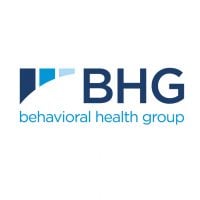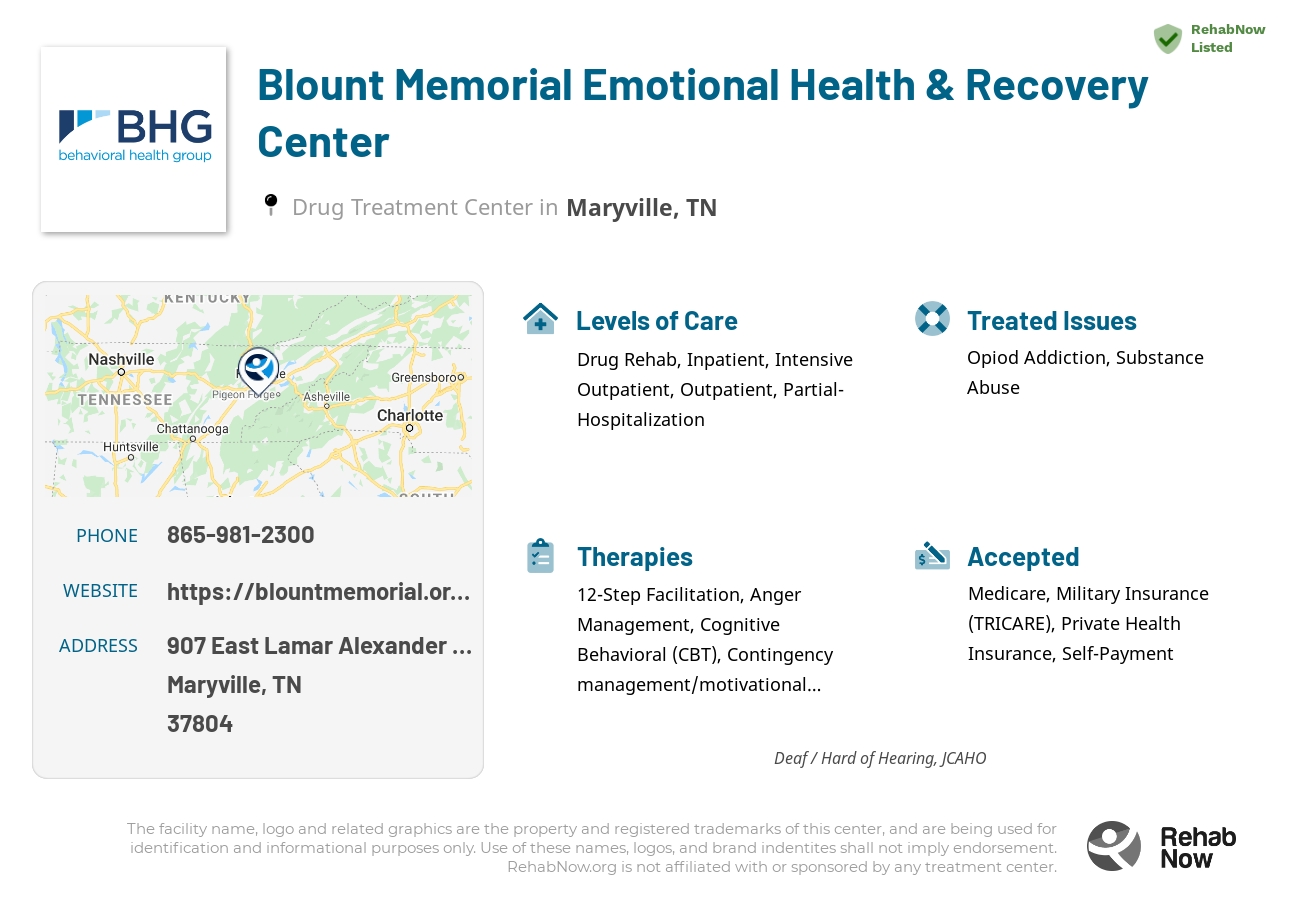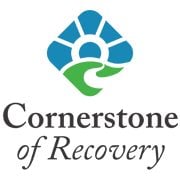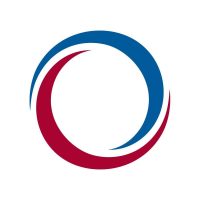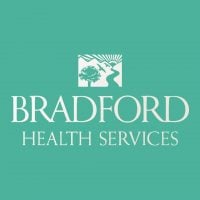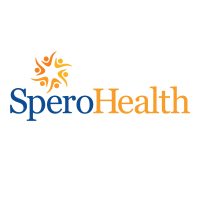Blount Memorial Emotional Health & Recovery Center
Drug Rehab Center in Maryville, Tennessee
Blount Memorial Emotional Health & Recovery Center is the leader in providing personalized, evidence-based treatment plans for opioid addiction, substance abuse and drug addiction in Maryville, TN, with JCAHO accreditation and insurance acceptance.
About This Maryville, TN Facility
Blount Memorial Emotional Health & Recovery Center, located in Maryville, Tennessee, has been providing comprehensive addiction treatment services since 1947. This facility focuses on helping individuals overcome substance abuse and addiction in a supportive, close-to-home setting.
Accredited by the Joint Commission on Accreditation of Healthcare Organizations (JCAHO), Blount Memorial offers a range of evidence-based treatment programs tailored to each individual's needs. These include inpatient, intensive outpatient, outpatient, partial-hospitalization, and detox services.
- Personalized treatment plans for effective recovery
- Experienced staff dedicated to patient well-being
- Holistic approach addressing mind, body, and spirit
- Accepting most private health insurance plans
Blount Memorial specializes in treating opioid addiction, substance abuse, and drug addiction. Their comprehensive programs provide a structured environment and support system to help individuals overcome their struggles with addiction.
For those battling opioid dependence, Blount Memorial offers a comprehensive opioid addiction treatment program. Through a combination of medication-assisted treatment, individual and group therapy, and holistic approaches, individuals can safely detox and develop the skills necessary for long-term recovery.
Genders
Ages
Modality
Additional
Accreditations

JCAHO
Conditions and Issues Treated
Substance abuse refers to the intensive and inappropriate use of psychoactive substances. Psychoactive substances are those that affect brain function. These include illegal drugs, alcohol, and even the excessive use of prescription drugs. The overuse of psychoactive substances leads to severe physical or psychological dependence. It also affects the social life and relationships of the affected individual. Substance abuse is treatable.
The duration of treatment at Blount Memorial Emotional Health & Recovery Center in Maryville can require weeks or even months depending on the severity of the condition as there is a risk of relapse. Treatment options include medications, counseling sessions, various types of behavioral therapy, and group therapy in different combinations.
Addiction to prescription opioid painkillers like oxycodone and hydrocodone, and illicit opioids such as heroin, leads to potentially life-threatening withdrawal symptoms when discontinued. Opioid addiction treatment typically involves an inpatient stay at facilities like Blount Memorial Emotional Health & Recovery Center to make sure they get through withdrawal safely. Treatment also includes comprehensive mental health counseling.
Levels of Care Offered
This center offers a variety of custom treatment tailored to individual recovery. Currently available are Detox, Drug Rehab, Inpatient, Intensive Outpatient, Outpatient, Partial-Hospitalization, with additional therapies available as listed below.
One of the first things an addict should do when entering treatment is to abstain from using illicit drugs completely. Depending on the length of time that the person has been using, the addict may have to go through alcohol or drug withdrawal. Fortunately, detox doesn’t have to be done alone, and withdrawal symptoms can be managed medically in an inpatient or outpatient setting. While detox may be uncomfortable, it is not life-threatening. Detoxification allows the addict to rid the body of all traces of drugs or alcohol and gives the addict a clean slate for their recovery.
Inpatient programs are intensive regimes that require individuals suffering from serious addictions to admit themselves into a controlled environment. Inpatient programs in Tennessee generally span over 28 days to six months. The first step in an inpatient program is medically assisted detox. Doctors and addiction specialists at Blount Memorial Emotional Health & Recovery Center monitor the individual’s vital signs as the drugs leave their system. Some inpatient rehab programs also provide counseling for family members to provide encouragement and emotional support. In inpatient programs, patients have access to 24-hour medical supervision.
Daily trips to the hospital that provides the treatment include intensive outpatient services (IOP). IOP in Tennessee is appropriate for patients in residential recovery facilities that have been diagnosed with addiction. Patients return to their everyday lives gradually, increasing the likeliness of success in treatment.
To assist with alcohol or opioid abuse, or a co-occurring condition, Blount Memorial Emotional Health & Recovery Center offers an outpatient treatment program. For their rehabilitation and other services, the Tennessee patient will go to the treatment center, yet return home every night. After most of the program is completed, the level of mandatory participation reduces.
To protect those dealing with acute symptoms of addiction, a partial hospitalization program is ideal in the treatment process. This ensures that the person is cared for in a hospital-like environment in Maryville, TN during the battle against drug addiction effects. Most PHPs need therapy for about six hours, at least three days a week.
Blount Memorial Emotional Health & Recovery Center‘s Therapies & Programs
Recovering from addiction involves recovering relationships as well. One of the most common areas of stress and damage during addiction is in intimate relationships. Couples therapy at Blount Memorial Emotional Health & Recovery Center can rebuild trust and joy that may have been damaged. Addiction involves everyone in the family, not only the addict.
Family roles can change in damaging ways that may require professional help to rebalance. Successful intimate relationships can decrease the chances for relapse by ensuring a healthy environment after rehab in Maryville, TN.
Addiction and alcoholism affect the entire family. For this reason, family therapy is vital to a person’s recovery from addiction. In contrast to couples counseling, family therapy at Blount Memorial Emotional Health & Recovery Center may include siblings, children, parents, and other significant people in the recovering person’s life. Family support is one of the most important pillars of recovery.
Many people turn to drugs and alcohol as a way of processing trauma that has affected them in the past. Trauma can include abuse, neglect, the loss of a loved one and other unpleasant incidents. Trauma therapy at Blount Memorial Emotional Health & Recovery Center helps patients process trauma. It gives them the tools to deal with it in a healthier manner.
Dialectical behavioral therapy (DBT) is a type of Cognitive Behavioral Therapy that focuses on eliminating specific negative thoughts such as suicidal thoughts that can potentially lead to an individual inflicting self-harm. It is useful in the treatment of patients exhibiting uncontrollable emotions, intense mood swings, and borderline personality disorders.
The term “Dialectic” means the integration of opposites. In the substance abuse context, DBT refers to accepting the patient’s addiction and working to change their thoughts and behavior. It improves life skills such as controlling the intense emotions without reacting impulsively, resolving the interpersonal conflicts effectively, and promoting awareness about self and others.
Cognitive Behavioral Therapy (CBT) examines the relationship between a patient’s thoughts, feelings and behaviors. Blount Memorial Emotional Health & Recovery Center aims to establish a healthy response to thoughts and feelings as an alternative to turning to drugs and alcohol. It also promotes healthy communication between addicts and those around them. It is and effective therapy for people suffering with all types of addictions.
Rational Emotive Behavior Therapy (REBT) is a type of cognitive therapy. It is based on the principle that irrational thoughts are responsible for the emotional and behavioral changes in addiction. So, the therapy starts with identifying the underlying irrational thoughts. These thoughts are then challenged and opposed logically and then replaced with positive thoughts. It also helps to change unwanted behavior with techniques such as meditation.
By imparting positive thoughts and emotions, Rational Emotive Behavior Therapy (REBT) makes the individual self-reliant with a capacity to handle the emotional and behavioral issues in future by themselves without professional help. This self-dependence benefits the patients and prevent relapses.
The recovery technique used by Alcoholics Anonymous is the 12 step program, but it can relate to any form of addiction. The 12 steps that addicts must take on the road to recovery are explained. Measures include acknowledging that you have a problem and agreeing to turn around your life. The curriculum, instructed by Blount Memorial Emotional Health & Recovery Center, also requires a belief in a greater power and making amends to others.
Contingency Management (CM), also called motivational incentives, is a type of pure behavioral therapy. It’s based on the idea that behavior is shaped, motivated, or controlled by its outcomes. CM is a clinical application at Blount Memorial Emotional Health & Recovery Center of operant conditioning, which helps clients eliminate unwanted behaviors by the use of positive and negative reinforcement.
Payment Options Accepted
For specific insurance or payment methods please contact us.
Is your insurance accepted?
Ask an expert, call (888) 674-0062
Additional Details
Specifics, location, and helpful extra information.
Maryville, Tennessee 37804 Phone Number(865) 981-2300 Meta DetailsUpdated April 15, 2024
Staff Verified
What else do people call Blount Memorial Emotional Health & Recovery Center?
People have occasionally also searched for “Blount Memorial Hospital Emotional Health and Recovery Center in Tennessee”
Patient Reviews
There are no reviews yet. Be the first one to write one.
Maryville, Tennessee Addiction Information
Tennessee joins the list of states with an above-average rate for drug and/or alcohol-induced deaths. Most of these deaths are related to opioids, such as prescription opioids. The Volunteer State ranks 2nd highest in the nation for the number of prescriptions given out. The state also ranks at the top for prescription drug-related overdoses.
Around 9% of people in Maryville, Tennessee, abuse drugs which makes the drug addiction problem in Maryville, Tennessee, fairly bad. Over 15% of the population in Maryville struggles with addiction to alcohol. Most commonly used drugs include marijuana, opioids (including prescription pain relievers and heroin), and cocaine. The rehab facilities in Maryville provide various treatment options, such as inpatient and outpatient care, and cater to a wide range of needs.
Treatment in Nearby Cities
- Pulaski, TN (177.3 mi.)
- Burns, TN (189.0 mi.)
- McEwen, TN (207.2 mi.)
- Linden, TN (218.3 mi.)
- Morristown, TN (48.8 mi.)
Centers near Blount Memorial Emotional Health & Recovery Center
The facility name, logo and brand are the property and registered trademarks of Blount Memorial Emotional Health & Recovery Center, and are being used for identification and informational purposes only. Use of these names, logos and brands shall not imply endorsement. RehabNow.org is not affiliated with or sponsored by Blount Memorial Emotional Health & Recovery Center.
